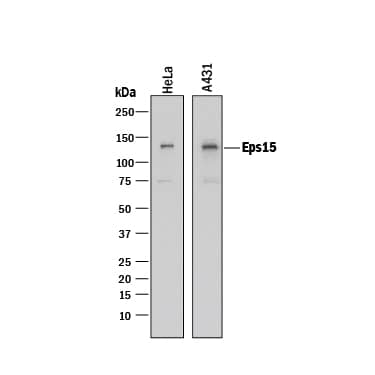Human Eps15 Antibody
R&D Systems, part of Bio-Techne | Catalog # MAB8480
Recombinant Monoclonal Antibody.


Conjugate
Catalog #
Key Product Details
Species Reactivity
Human
Applications
Immunocytochemistry, Intracellular Staining by Flow Cytometry, Simple Western, Western Blot
Label
Unconjugated
Antibody Source
Recombinant Monoclonal Rabbit IgG Clone # 1261C
Product Specifications
Immunogen
E.coli-derived recombinant human Eps15
Ala448-Thr579
Accession # P42566
Ala448-Thr579
Accession # P42566
Specificity
Detects human Eps15 in direct ELISAs and Western blots.
Clonality
Monoclonal
Host
Rabbit
Isotype
IgG
Scientific Data Images for Human Eps15 Antibody
Detection of Human Eps15 by Western Blot.
Western blot shows lysates of HeLa human cervical epithelial carcinoma cell line and A431 human epithelial carcinoma cell line. PVDF membrane was probed with 0.1 µg/mL of Rabbit Anti-Human Eps15 Monoclonal Antibody (Catalog # MAB8480) followed by HRP-conjugated Anti-Rabbit IgG Secondary Antibody (Catalog # HAF008). A specific band was detected for Eps15 at approximately 140 kDa (as indicated). This experiment was conducted under reducing conditions and using Immunoblot Buffer Group 1.Eps15 in HeLa Human Cell Line.
Eps15 was detected in immersion fixed HeLa human cervical epithelial carcinoma cell line using Rabbit Anti-Human Eps15 Monoclonal Antibody (Catalog # MAB8480) at 1 µg/mL for 3 hours at room temperature. Cells were stained using the NorthernLights™ 557-conjugated Anti-Rabbit IgG Secondary Antibody (red; Catalog # NL004) and counterstained with DAPI (blue). Specific staining was localized to cytoplasm. View our protocol for Fluorescent ICC Staining of Cells on Coverslips.Detection of Eps15 in U‑118‑MG Human Cell Line by Flow Cytometry.
U-118-MG human glioblastoma/astrocytoma cell line was stained with Rabbit Anti-Human Eps15 Monoclonal Antibody (Catalog # MAB8480, filled histogram) or isotype control antibody (Catalog # AB-105-C, open histogram), followed by Allophycocyanin-conjugated Anti-Rabbit IgG Secondary Antibody (Catalog # F0111). To facilitate intracellular staining, cells were fixed and permeabilized with FlowX FoxP3 Fixation & Permeabilization Buffer Kit (Catalog # FC012). View our protocol for Staining Intracellular Molecules.Applications for Human Eps15 Antibody
Application
Recommended Usage
Immunocytochemistry
1-25 µg/mL
Sample: Immersion fixed HeLa human cervical epithelial carcinoma cell line
Sample: Immersion fixed HeLa human cervical epithelial carcinoma cell line
Intracellular Staining by Flow Cytometry
0.25 µg/106 cells
Sample: U‑118‑MG human glioblastoma/astrocytoma cell line was fixed and permeabilized with FlowX FoxP3 Fixation & Permeabilization Buffer Kit (Catalog # FC012)
Sample: U‑118‑MG human glioblastoma/astrocytoma cell line was fixed and permeabilized with FlowX FoxP3 Fixation & Permeabilization Buffer Kit (Catalog # FC012)
Simple Western
1 µg/mL
Sample: HeLa human cervical epithelial carcinoma cell line, MCF‑7 human breast cancer cell line, A431 human epithelial carcinoma cell line, and Jurkat human acute T cell leukemia cell line
Sample: HeLa human cervical epithelial carcinoma cell line, MCF‑7 human breast cancer cell line, A431 human epithelial carcinoma cell line, and Jurkat human acute T cell leukemia cell line
Western Blot
0.1 µg/mL
Sample: HeLa human cervical epithelial carcinoma cell line and A431 human epithelial carcinoma cell line
Sample: HeLa human cervical epithelial carcinoma cell line and A431 human epithelial carcinoma cell line
Formulation, Preparation, and Storage
Purification
Protein A or G purified from cell culture supernatant
Reconstitution
Reconstitute at 0.5 mg/mL in sterile PBS For liquid material, refer to CoA for concentration.
Formulation
Lyophilized from a 0.2 μm filtered solution in PBS with Trehalose. *Small pack size (SP) is supplied either lyophilized or as a 0.2 µm filtered solution in PBS.
Shipping
Lyophilized product is shipped at ambient temperature. Liquid small pack size (-SP) is shipped with polar packs. Upon receipt, store immediately at the temperature recommended below.
Stability & Storage
Use a manual defrost freezer and avoid repeated freeze-thaw cycles.
- 12 months from date of receipt, -20 to -70 °C as supplied.
- 1 month, 2 to 8 °C under sterile conditions after reconstitution.
- 6 months, -20 to -70 °C under sterile conditions after reconstitution.
Background: Eps15
Long Name
EGFR Pathway Substrate 15
Alternate Names
AF1P, MLLT5
Gene Symbol
EPS15
UniProt
Additional Eps15 Products
Product Documents for Human Eps15 Antibody
Product Specific Notices for Human Eps15 Antibody
For research use only
